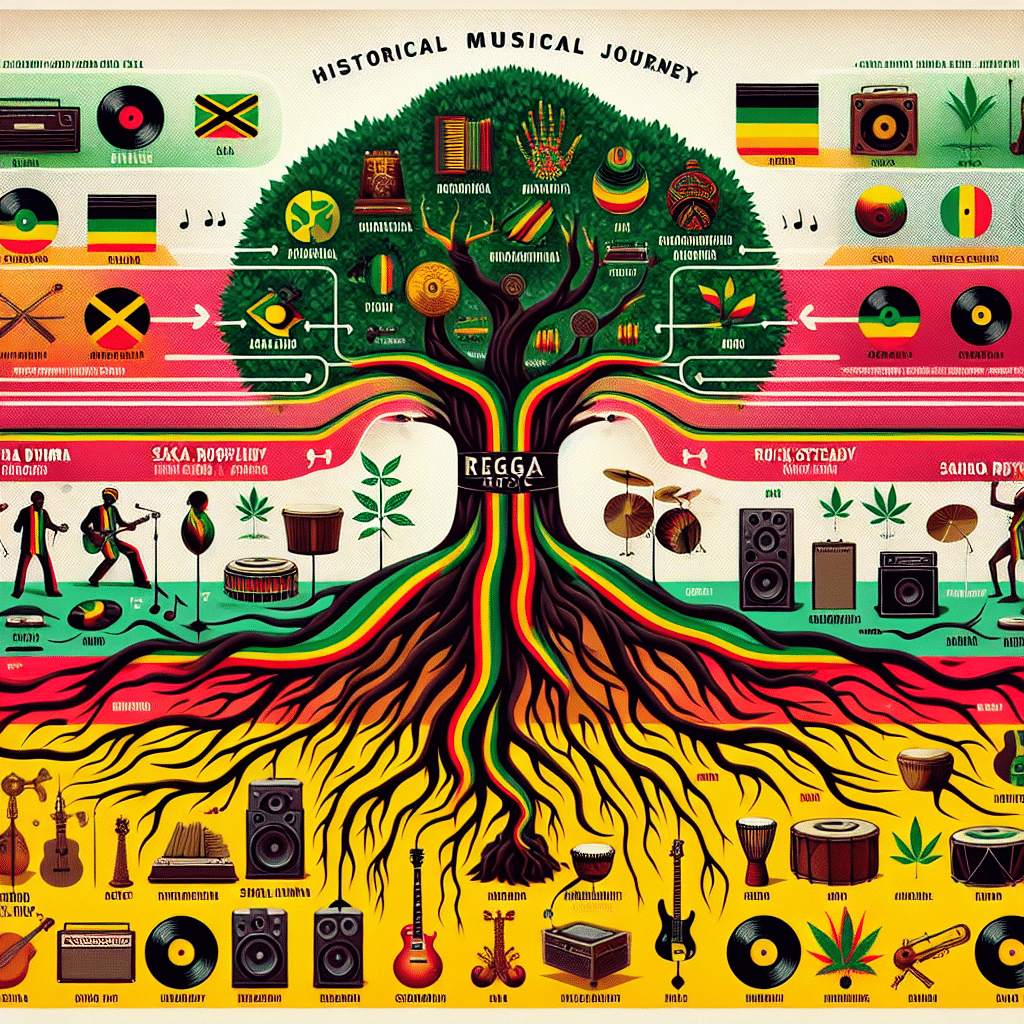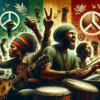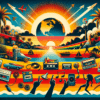Roots of Rhythm: Exploring the Evolution of Jamaican Reggae Music

Reggae music, with its unmistakable beat and rich socio-political narrative, has enthralled listeners around the globe since its emergence in the late 1960s. While many associate reggae with the legendary Bob Marley, the genre's roots run deep into Jamaica’s diverse cultural soil, reflecting its history, struggles, and unquenchable spirit. This article delves into the evolution of Jamaican reggae music, tracing its historical origins, musical influences, and impact on society.
The Historical Context of Reggae
To understand the evolution of reggae, one must first consider Jamaica's complex history. The island has been a melting pot of cultures since its colonization, with the indigenous Taíno people, African slaves, and European colonizers contributing to its rich tapestry. The abolition of slavery in the 1830s brought about significant socio-economic changes, leading to the emergence of new cultural expressions.
In the 1950s, the rise of ska—a fast-paced, jazzy genre that incorporated Caribbean rhythms—marked the beginning of modern Jamaican music. Ska was a reflection of the vibrant, post-colonial Jamaican identity, drawing influences from American rhythm and blues and jazz. As ska evolved, it gave way to rocksteady, characterized by a slower tempo and a focus on basslines, laying the groundwork for reggae.
The Birth of Reggae
See Also: The Rhythm of Resistance: How Reggae Beats Define Culture and Change
The Rhythm of Resistance: How Reggae Beats Define Culture and ChangeReggae properly emerged in the late 1960s, building on the foundations laid by ska and rocksteady. The term "reggae" is believed to have been derived from the Jamaican slang "reggae, which means 'ragged' or 'the ragged boy.' The genre was distinctly marked by its offbeat rhythm, known as the "one drop," where the emphasis is placed on the third beat in a measure.
This period saw the rise of influential figures like Toots and the Maytals, who were instrumental in popularizing reggae music both locally and internationally. The incorporation of socially conscious lyrics addressing issues like poverty, oppression, and political injustice resonated with audiences. Songs like "Pressure Drop" became anthems of resilience and resistance.
The Golden Era of Reggae
Reggae entered its golden era in the 1970s, epitomized by the global superstar Bob Marley. With his band, the Wailers, Marley brought reggae to a worldwide audience, using music as a vehicle for his message of love, unity, and social justice. Hits like "One Love," "No Woman, No Cry," and "Redemption Song" remain timeless classics that highlight reggae’s powerful narrative and emotional depth.
Beyond Marley, the 1970s saw the emergence of other prominent reggae artists, including Peter Tosh, Bunny Wailer, and Jimmy Cliff. This period solidified reggae as a genre deeply intertwined with the Rastafarian movement, which celebrated African heritage, spirituality, and resistance against oppression. Reggae became not just a musical form but a cultural movement that championed the rights of the marginalized.
See Also: From the Islands to the World: The Evolution of Reggae Music
From the Islands to the World: The Evolution of Reggae MusicReggae’s Global Influence
The late 1970s and early 1980s marked reggae's transition into the global music scene. Jamaican artists began to collaborate with international musicians, and reggae influenced numerous genres, including punk, pop, and hip-hop. Artists such as The Clash adopted reggae rhythms in their music, broadening its appeal beyond Jamaica.
In the 1990s, the emergence of dancehall—a sub-genre of reggae characterized by a quicker tempo and digital instrumentation—further diversified the reggae landscape. Artists like Shabba Ranks and Sean Paul introduced a new, energetic style that attracted younger audiences. This genre's fusion of rap and reggae rhythms set the stage for contemporary reggae artists.
The Legacy of Reggae Music
As reggae music evolved, it continued to serve as a source of inspiration and empowerment for marginalized communities worldwide. Its themes of resistance and social justice resonate far beyond Jamaica’s shores, influencing movements for equality and human rights. Moreover, reggae music has become a global phenomenon, leading to the emergence of reggae festivals, radio stations, and cultural exchange programs promoting Jamaican music and culture.
Reggae has also found its way into various other genres, blending with hip-hop, jazz, and electronic music to create new and exciting forms. This adaptability is a testament to reggae's lasting impact on the global music landscape.
See Also: Reggae Revolution: How Jamaican Beats Conquered the World
Reggae Revolution: How Jamaican Beats Conquered the WorldConclusion
The journey of Jamaican reggae music—from its roots in the rich cultural amalgamation of Jamaica to its status as a global phenomenon—mirrors the island's socio-political evolution. Reggae is more than music; it is a reflection of the people's resilience, struggles, and unwavering spirit for freedom and justice. Understanding the evolution of reggae helps us appreciate the intricate tapestry of narratives encapsulated within its rhythms and lyrics.
In a world rife with challenges, the enduring legacy of reggae serves as a reminder of the power of music as a vehicle for change and unity. As we continue to explore and celebrate this remarkable genre, we pay homage to those who paved the way for its evolution and continue to inspire generations through their artistry.
FAQs
1. What is the origin of the word "reggae"?
The word "reggae" is believed to derive from the Jamaican slang term "reggay," referencing ragged or untidy clothing, which reflects the genre's laid-back style.
See Also: Legends of the Lane: Celebrating Jamaica's Iconic Reggae Artists
Legends of the Lane: Celebrating Jamaica's Iconic Reggae Artists2. How did Rastafarian culture influence reggae music?
Rastafarianism has significantly influenced reggae by promoting themes of social justice, resistance against oppression, and a connection to African heritage. Many reggae songs embody Rastafarian beliefs and principles.
3. What distinguishes dancehall from traditional reggae?
Dancehall is a sub-genre of reggae characterized by a faster tempo, the use of digital instrumentation, and often more explicit lyrics. It emerged in the late 1970s and gained popularity in the 1980s.
4. Who are some of the most influential reggae artists?
Some of the most influential reggae artists include Bob Marley, Peter Tosh, Jimmy Cliff, Toots and the Maytals, Bunny Wailer, and more contemporary artists like Sean Paul and Protoje.
See Also: From Trenchtown to the Global Stage: The Journey of Reggae Music
From Trenchtown to the Global Stage: The Journey of Reggae Music5. How has reggae music been received internationally?
Reggae music has achieved global popularity, influencing numerous genres and artists worldwide. It has become a cultural emblem for many movements advocating for social justice and equality. Global reggae festivals and events celebrate the genre’s rich history and its ongoing evolution.
If you want to know other articles similar to Roots of Rhythm: Exploring the Evolution of Jamaican Reggae Music you can visit the category Reggae.
